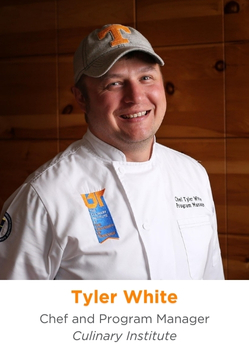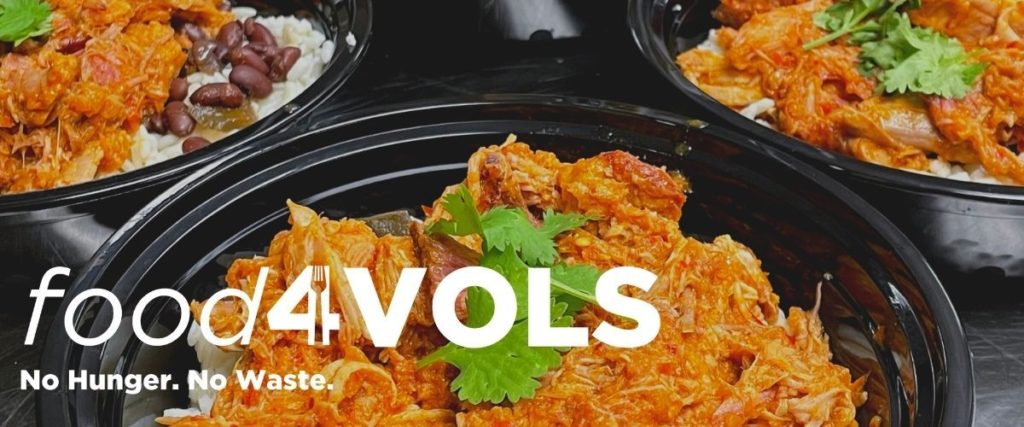“No hunger. No waste.” These four words lead the charge for an exciting, new food recovery initiative on the University of Tennessee, Knoxville, campus known as Food4VOLS.
 It all started during a meeting with Tyler White, chef and program manager for the Department of Retail, Hospitality, and Tourism Management’s Culinary Institute, and Jay Price, sustainability manager in the Office of Sustainability. The two recognized a distinct need at the university and a unique opportunity to address it. “At any given point during a semester one out of three students experiences food insecurity on college campuses,” explains White. At the same time, perfectly good, unused food has historically been discarded around our campus at profound rates.
It all started during a meeting with Tyler White, chef and program manager for the Department of Retail, Hospitality, and Tourism Management’s Culinary Institute, and Jay Price, sustainability manager in the Office of Sustainability. The two recognized a distinct need at the university and a unique opportunity to address it. “At any given point during a semester one out of three students experiences food insecurity on college campuses,” explains White. At the same time, perfectly good, unused food has historically been discarded around our campus at profound rates.
 So, where to begin? Once the framework was developed for tackling food insecurity while simultaneously cutting down on food waste, White and Price teamed up with Vol Dining and the Office of the Dean of Students to organize the food recovery and distribution efforts. The food recovered from Vol Dining locations varies from fresh produce to cooked food that was prepared for distribution but never sold. Without the Food4VOLS recovery efforts, this food otherwise would have been thrown away.
So, where to begin? Once the framework was developed for tackling food insecurity while simultaneously cutting down on food waste, White and Price teamed up with Vol Dining and the Office of the Dean of Students to organize the food recovery and distribution efforts. The food recovered from Vol Dining locations varies from fresh produce to cooked food that was prepared for distribution but never sold. Without the Food4VOLS recovery efforts, this food otherwise would have been thrown away.
According to White, “This initiative diverts upwards of ten tons (20,000 pounds) of food from being discarded on campus. Vol Dining employees are very excited about the program and have embraced the new recovery process. They are happy to see the food being used to feed those in need instead of going to waste.”
Here’s how the Food4VOLS process works:
First, food is recovered from various Vol Dining locations. The food then makes its way to the Culinary Institute, where volunteers and students, led by Tyler White, use the recovered food to build recipes and prepare nutritious meals. After everything is packaged and ready for distribution, the meals are delivered to the Big Orange Pantry, located on the ground floor of Greve Hall. Once at the BOP, students, faculty, and staff are able to pick up a tasty, ready-to-heat meal, along with any other food or supplies they may need, entirely free of charge.
The Food4VOLS meals and menu options are never set in stone because the ingredients are not known to the Culinary Institute until they receive the recovered food. So far, Food4VOLS meals have included: gumbo, eggplant lasagna, stuffed peppers, spaghetti, buffalo chicken macaroni and cheese, breakfast sandwiches, enchiladas, fried rice, salads, steak and rice bowls, and freshly baked bread. For White, there’s something exciting about building a recipe on the spot using only what is provided; it makes the food prep process especially creative and fun. Above all, he and his food prep team strive to offer variety in their meals while meeting the dietary needs of the students, faculty, and staff who will receive them.
Since its launch at the beginning of the Fall 2021 semester, food4VOLS has provided over 1,000 meals to those in need, while also diverting over 3,000 pounds of food from being discarded.
“The only drawback we are seeing is that the need for the program is larger than we anticipated,” said White. While initially planning to create twenty-five meals a day to distribute to the Big Orange Pantry, the Food4VOLS team has produced an average of seventy-five meals, often running out before the end of the day.
“We are spending more time preparing meals and spending more money on supplies than we initially intended,” White continues, “This is a good problem, in that we are helping more people with food insecurity, but at the same time, it is depleting our resources which forces us to fundraise to keep pace with the needs on campus.”
The good news is that there are ways to help Food4VOLS continue to grow at UT and keep fighting food insecurity in our campus community. First, individuals are invited to volunteer their time by signing up to prepare meals. Interested volunteers can sign up to serve through the Jones Center for Leadership and Service. Secondly, individuals can make a financial donation to the Food4VOLS Impact Fund, which allows the initiative to continue to thrive and bring on more volunteers to assist in food collection, meal production, and meal distribution.
“From a chef standpoint, I look forward to seeing what meals we will prepare and the difference we can make on campus addressing food insecurity. From a program standpoint, I hope to see the program capable of being able to prepare meals that can be distributed to others in the Knoxville area suffering from food insecurity,” said White. “The end goal Food4VOLS is to reduce food insecurity on our campus and create a template of the program that can be replicated on other college and university campuses across the US.”
If you would like to learn more about Food4VOLS, visit rhtm.utk.edu/food4vols or download a PDF infographic.



